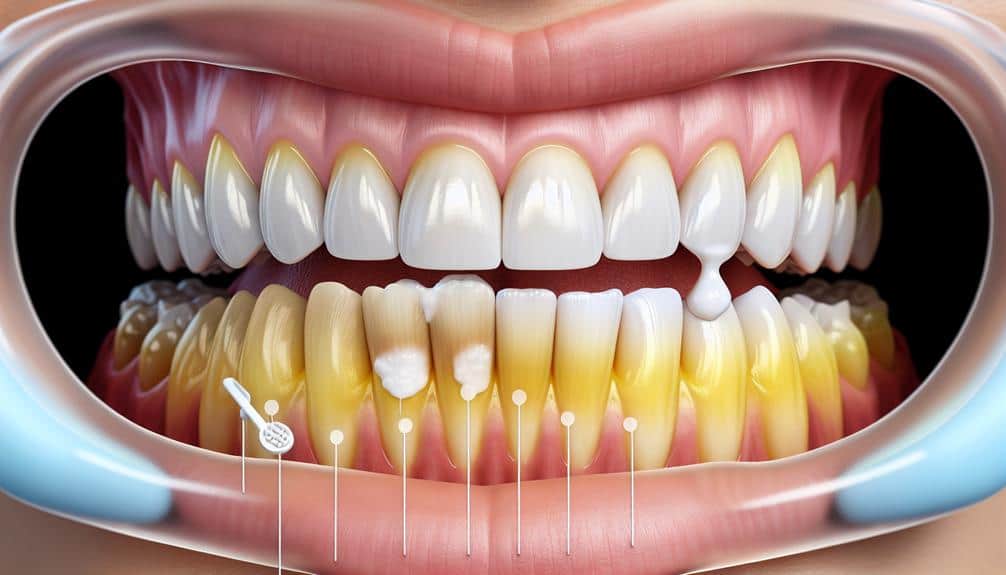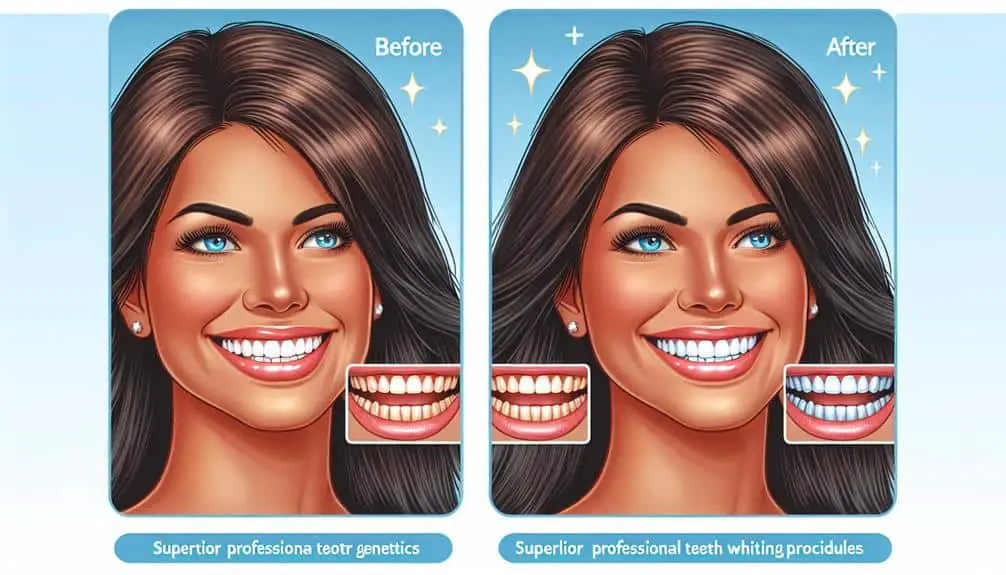To naturally whiten genetic tooth discoloration, try home remedies like baking soda and hydrogen peroxide. Activated charcoal can bind to toxins for whitening effects. Coconut oil used for oil pulling offers antimicrobial benefits. Remember to patch test new remedies first. Don't overuse to safeguard enamel. Consult your dentist for assurance. Maintain oral health with fluoride toothpaste and gentle brushing. Avoid sugary and acidic foods. Stay hydrated and eat calcium-rich foods. Prevent staining by avoiding certain foods and quit smoking. Periodic touch-up whitening treatments can help. Dentist guidance guarantees a bright smile.
Key Points
- Use natural remedies like baking soda and activated charcoal for whitening.
- Conduct patch tests and consult a professional before trying home remedies.
- Maintain a healthy oral care routine with fluoride toothpaste and balanced diet.
- Avoid staining foods, quit smoking, and consider touch-up treatments for long-term results.
- Understand genetic factors, enamel development, and risks associated with DIY whitening methods.
Understanding Genetic Tooth Discoloration
To understand genetic tooth discoloration, it's important to grasp the underlying factors that contribute to this inherited condition. Genetic factors play a significant role in determining the color of your teeth. Discoloration causes can be traced back to specific genes that influence the development and maintenance of tooth enamel. Inherited traits such as the thickness and smoothness of enamel, as well as the natural color of dentin, can affect the overall appearance of your teeth.
Furthermore, genetic variations can also impact how susceptible your teeth are to staining and discoloration over time. Understanding these underlying genetic factors is vital in managing and addressing genetic tooth discoloration. Maintaining good dental health practices, such as regular brushing, flossing, and dental check-ups, can help minimize the impact of genetic factors on tooth discoloration.
Identifying Natural Whitening Solutions
Understanding genetic tooth discoloration lays the foundation for exploring natural whitening solutions that can help enhance the brightness of your smile.
When looking for ways to whiten your teeth naturally, consider DIY whitening tricks and natural remedies that can be effective in addressing genetic tooth discoloration. One popular DIY trick is using baking soda and hydrogen peroxide as a gentle abrasive paste to remove surface stains.
Additionally, natural remedies like activated charcoal, which has adsorbent properties that can bind to toxins and stains on the teeth, are gaining popularity for their whitening effects.
Another natural option is oil pulling with coconut oil, known for its antimicrobial properties that may contribute to oral health and potentially help whiten teeth over time.
These natural solutions offer a gentler approach to whitening teeth and can be incorporated into your oral care routine for gradual but noticeable results. Remember, consistency is key when trying out these natural whitening methods.
Implementing Home Remedies Safely
Safely implementing home remedies for whitening genetic tooth discoloration involves understanding proper application techniques and potential risks. When considering DIY treatments or herbal remedies, it's important to follow these guidelines:
- Patch Test: Before using any new home remedy, conduct a patch test on a small area to check for any allergic reactions or sensitivity.
- Moderation: Avoid excessive use of home remedies, as overuse can lead to enamel damage or gum irritation.
- Consultation: If you're unsure about a particular home remedy or its safety, consult with a dental professional to confirm it's suitable for your oral health.
Adopting a Healthy Oral Care Routine
When establishing a good oral care regimen, prioritize consistency in your daily habits to ensure excellent dental health. Proper brushing is crucial for maintaining healthy teeth and gums. Make sure to brush your teeth at least twice a day, using fluoride toothpaste and a soft-bristled toothbrush. Remember to brush gently in circular motions to eliminate plaque and prevent enamel damage.
Additionally, incorporating dietary changes can greatly impact your oral health. Limit sugary and acidic foods and drinks as they can contribute to tooth decay and discoloration. Instead, opt for a balanced diet rich in fruits, vegetables, and calcium-rich foods to support strong teeth. Drinking plenty of water throughout the day can also help rinse away food particles and reduce the risk of cavities.
Maintaining Long-Term Whitening Results
To maintain long-term whitening results, it's important to consistently follow post-whitening care recommendations provided by your dentist. These suggestions are vital in ensuring that your teeth retain their brightness over time.
Here are some key tips to help you maintain your whitening results effectively:
- Diet Adjustments: Avoid foods and beverages that are known to stain teeth, such as coffee, tea, red wine, and berries. Opt for a teeth-friendly diet rich in fruits and vegetables that can help prevent discoloration.
- Lifestyle Changes: Quit smoking to prevent yellowing of the teeth and maintain your whitening results. Smoking not only stains teeth but also affects overall oral health.
- Professional Treatments: Consider periodic touch-up whitening treatments to combat any gradual staining that may occur. Your dentist can recommend the best schedule for these treatments to keep your smile bright.
Frequently Asked Questions
Can Genetic Tooth Discoloration Be Completely Reversed With Natural Whitening Solutions?
You cannot completely reverse genetic tooth discoloration with natural solutions alone. Herbal remedies, DIY techniques, and lifestyle changes might help, but for significant results, professional treatments like whitening procedures are often necessary to achieve noticeable improvement.
Are There Any Specific Foods or Beverages That Should Be Avoided to Prevent Further Staining of Genetically Discolored Teeth?
To prevent further staining of genetically discolored teeth, you should consider dietary restrictions. Avoiding foods and beverages like coffee, red wine, and dark sodas can help. Additionally, using whitening toothpaste regularly and considering professional treatments can make a significant difference.
Is It Possible to Overdo Natural Whitening Remedies and Harm the Enamel of Genetically Discolored Teeth?
When using natural remedies to whiten teeth, remember enamel safety. Overdoing it can harm teeth. Balance is key for tooth health. Understand the whitening risks and proceed cautiously to maintain enamel strength.
Are There Any Genetic Factors That May Affect the Effectiveness of Natural Whitening Solutions on Tooth Discoloration?
When it comes to genetic influences on the effectiveness of natural remedies for tooth discoloration, you might find that certain genetic factors play a role. Understanding these nuances can help you navigate your whitening journey effectively.
How Often Should Someone With Genetic Tooth Discoloration Follow a Healthy Oral Care Routine to Maintain Long-Term Whitening Results?
To maintain long-term whitening results for genetic tooth discoloration, follow a consistent oral care routine. Brush twice daily with whitening toothpaste, floss, and use a mouthwash. Visit your dentist regularly for check-ups and professional cleanings to guarantee excellent oral health.



